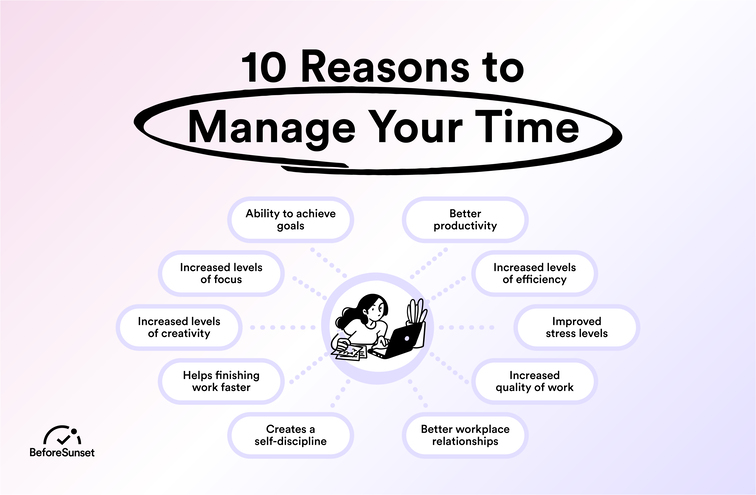Why Is Time Management Important?
Time management is important because it increases productivity and efficiency, allowing individuals to accomplish tasks within set deadlines. Effective time management skills enable individuals to prioritize, plan, and organize their activities, resulting in improved performance and reduced stress levels.
With proper time management, individuals can allocate their resources effectively, focus on important tasks, minimize distractions, and achieve better work-life balance. It also helps individuals identify and eliminate time-wasting activities, create realistic schedules, and make the most out of their available time.
By managing time effectively, individuals can stay motivated, meet deadlines, and achieve their goals efficiently, leading to personal and professional success.
Improved Productivity
Time management is crucial for improved productivity. Efficiently organizing tasks and prioritizing allows individuals to accomplish more in the same amount of time, leading to better outcomes and increased efficiency.
Reduces Procrastination
Improved productivity is a direct result of effective time management. Let’s delve into how time management can reduce procrastination and help you achieve more in less time.
Enhances Focus
When you manage your time well, you are better able to focus on the task at hand. Here’s how improved time management enhances your focus:
- Eliminates distractions: By planning your schedule in advance, you can allocate specific time slots for important tasks, minimizing distractions that often hinder productivity.
- Prioritizes tasks: Time management allows you to prioritize your tasks based on urgency and importance. By focusing on high-priority tasks, you avoid getting overwhelmed and maintain your concentration.
- Blocks out time for deep work: Deep work requires sustained attention and concentration. With proper time management, you can allocate dedicated blocks of time specifically for focused, uninterrupted work.
By prioritizing tasks, avoiding distractions, and dedicating time for deep work, you enhance your focus and increase your productivity.

Credit: www.beforesunset.ai
Reduced Stress Levels
One area where effective time management can greatly impact your life is by reducing your stress levels. Stress is a common occurrence in today’s fast-paced world, and it can have detrimental effects on both our physical and mental health. By managing your time effectively, you can minimize stress and enjoy a more balanced and fulfilling life.
Better Work-life Balance
One key benefit of time management is achieving a better work-life balance. Many of us struggle to juggle our demanding jobs, family responsibilities, and personal interests. Without proper time management, it’s easy to become overwhelmed and feel like there’s never enough time to do everything. By allocating your time efficiently and prioritizing tasks, you can create a schedule that allows for dedicated time for work and personal pursuits. This balance is crucial for maintaining your overall well-being and happiness.
Increased Control
Another advantage of effective time management is increased control over your life. When you take charge of your time, you gain a sense of empowerment and control. Instead of being constantly reactive and scrambling to meet deadlines, you can proactively plan your days and weeks, ensuring that you have time for both important tasks and activities that bring you joy. This control allows you to make intentional choices, take on new challenges, and pursue personal growth.
By managing your time effectively, you become more efficient and productive, reducing the likelihood of feeling overwhelmed or rushed. As a result, you can approach each day with a calmer and more focused mindset, leading to reduced stress levels. With a reduced workload and better work-life balance, you can enjoy a greater sense of control over your life, enabling you to prioritize what truly matters and live a fulfilling and less stressful life.
Increased Opportunities
When it comes to time management, one of the key benefits is the increased opportunities it brings. By effectively managing your time, you create more room for growth, skill development, and professional advancement. In this section, we will explore how time management can lead to increased opportunities through more time for skill development and enhanced professional growth.
Skill Development
In today’s fast-paced and competitive world, acquiring new skills is crucial for staying ahead. Time management plays a vital role in this aspect by providing you with more time to dedicate to skill development. By efficiently organizing your tasks and priorities, you can create a schedule that allows for regular skill-building activities.
Consider dividing your day into focused blocks of time for specific skills. For example, you could set aside 30 minutes each morning to learn a new language or dedicate an hour every evening to practice coding. By consistently allocating time towards skill development, you can enhance your expertise and proficiency, opening up new doors and possibilities.
Professional Growth
Time management not only aids in skill development but also contributes to overall professional growth. By effectively utilizing your time, you can increase your productivity and accomplish more tasks in a shorter period. This creates a positive impression and ensures that you consistently meet deadlines, exceeding expectations.
When you consistently manage your time well, you become known for your reliability and efficiency, which can lead to promotions, career advancements, and more significant opportunities. Employers and colleagues value individuals who can effectively manage their time, as it demonstrates discipline, commitment, and the ability to handle multiple responsibilities simultaneously.
Additionally, by managing your time effectively, you can allocate more moments for networking, attending industry events, and building professional relationships. These activities allow you to exchange ideas, collaborate with industry experts, and gain new insights. As a result, your professional network expands, exposing you to a broader range of opportunities.

Credit: paperbell.com
Improved Decision Making
Time management is crucial for improved decision making. By effectively managing your time, you can prioritize tasks, analyze situations, and make informed choices, leading to increased productivity and success.
Better Prioritization
Time management plays a crucial role in improving decision-making skills. It allows individuals to prioritize tasks effectively, ensuring that important activities are not overlooked or delayed. By allocating time to different tasks, you can identify the most important and urgent ones, helping you make better decisions. Prioritizing tasks enables you to focus on pressing matters, reducing stress and ensuring that deadlines are met.
Effective Planning
Efficient time management leads to effective planning, a key factor in making sound decisions. With proper planning, you can allocate sufficient time to research, analyze, and consider all relevant factors before making a decision. Planning enables you to break down complex tasks into manageable steps and allocate resources wisely. This process provides a clear roadmap to follow, preventing hasty decisions based on incomplete information or limited time.
Planning also helps you determine which tasks can be delegated or eliminated, freeing up more time for critical decision-making. By setting achievable goals and establishing deadlines, you can ensure that decisions are made in a timely manner, avoiding last-minute rush or procrastination.
Here are a few benefits of effective planning:
- Ensures all necessary steps are considered.
- Allows for the identification of potential risks and challenges.
- Increases overall productivity and efficiency.
- Reduces the likelihood of errors or oversights.
In summary, effective planning enhances decision-making by providing structure, clarity, and the ability to weigh options and potential outcomes.
Achievement Of Goals
Effective time management plays a crucial role in achieving goals by optimizing productivity, prioritizing tasks, and minimizing distractions. With proper time allocation, individuals can focus on important activities, enhance efficiency, and accomplish their objectives efficiently.
Clearer Objectives
Effective time management is crucial for achieving goals. When you manage your time properly, you gain clarity about your objectives. Without a plan and proper time allocation, your goals may seem vague and overwhelming. However, by implementing time management strategies, you can break down your goals into actionable steps, making them more attainable and less intimidating.
Having clearer objectives enables you to stay focused and motivated. It provides a roadmap that outlines the necessary tasks and deadlines for each goal, allowing you to prioritize your work effectively. With a clear plan in place, you can allocate your time appropriately, dedicating the necessary hours to each task.
Higher Success Rate
Time management directly contributes to a higher success rate in achieving your goals. When you manage your time efficiently, you are more likely to complete tasks on time and meet deadlines. By utilizing time management techniques, you reduce procrastination and avoid last-minute rushes, which can often result in a lower quality of work.
Properly managing your time also helps you identify the most productive periods of the day. By recognizing your peak energy and focus levels, you can schedule important tasks during these times, increasing your efficiency and overall success rate. Moreover, efficient time management allows you to allocate sufficient time to review and revise your work, improving its quality and increasing the chances of achieving your goals.
Furthermore, by effectively managing your time, you can allocate specific time slots for leisure and relaxation. Taking breaks from work boosts your productivity and prevents burnout, enhancing your overall success rate in achieving goals.

Credit: bhuwan0.medium.com
Frequently Asked Questions Of Why Is Time Management Important?
Why Is Time Management Important For Students?
Time management is important for students to balance their academics, extracurricular activities, and personal life, leading to improved productivity and reduced stress levels.
How Does Time Management Benefit Professionals?
Effective time management helps professionals prioritize tasks, meet deadlines, increase productivity, and maintain work-life balance, leading to career growth and success.
Why Is Time Management Crucial For Entrepreneurs?
Time management is crucial for entrepreneurs to maximize productivity, prioritize business activities, make efficient decisions, and achieve business objectives within the set timeframe.
Conclusion
Effective time management is essential for individuals and organizations alike. With proper time management, individuals can prioritize tasks, enhance productivity, and reduce stress. It allows for better work-life balance and helps achieve personal and professional goals. For businesses, efficient time management ensures meeting deadlines, improving efficiency, and maximizing profits.
By valuing and managing time effectively, one can make the most out of every day and ultimately lead a more fulfilling and successful life.




